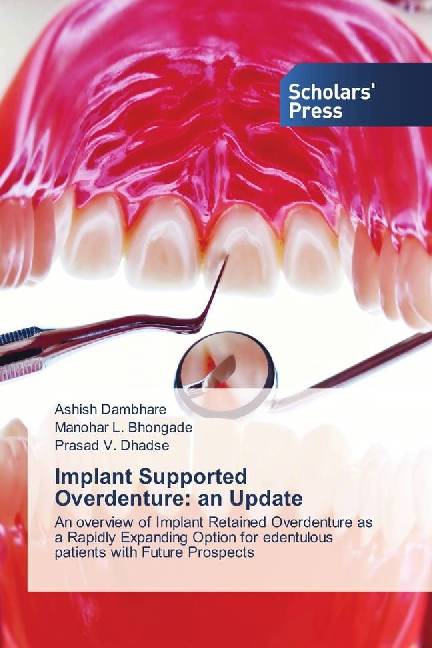
- Afhalen na 1 uur in een winkel met voorraad
- Gratis thuislevering in België vanaf € 30
- Ruim aanbod met 7 miljoen producten
- Afhalen na 1 uur in een winkel met voorraad
- Gratis thuislevering in België vanaf € 30
- Ruim aanbod met 7 miljoen producten
Zoeken
Implant Supported Overdenture: an Update
An overview of Implant Retained Overdenture as a Rapidly Expanding Option for edentulous patients with Future Prospects
Ashish Dambhare, Manohar L. Bhongade, Prasad V. Dhadse
Paperback | Engels
€ 59,45
+ 118 punten
Omschrijving
Edentulism still has a high prevalence in the elderly population and is generally considered a common clinical entity. The conventional method for treating edentulism is to provide complete dentures. However, conventional complete dentures can restore chewing function only to a limited degree and has variable limitations. The introduction of implants to retain dentures has been a huge improvement for those patients and offered new treatment alternatives. Over the period of time, various researches has been imparted to understand its various aspects and its effects on the human tissues. Different number of implants and its distribution pattern with several attachment systems have been compared in terms of stress or stress distribution in order to appraise patients' satisfaction and prosthetic outcome. The current review provides updated literature on implant bearing overdentures as well as immediate implant, early loading of implant and zirconia implants in relation to implant bearing overdenture.
Specificaties
Betrokkenen
- Auteur(s):
- Uitgeverij:
Inhoud
- Aantal bladzijden:
- 116
- Taal:
- Engels
Eigenschappen
- Productcode (EAN):
- 9783659839856
- Uitvoering:
- Paperback
- Afmetingen:
- 150 mm x 220 mm

Alleen bij Standaard Boekhandel
+ 118 punten op je klantenkaart van Standaard Boekhandel
Beoordelingen
We publiceren alleen reviews die voldoen aan de voorwaarden voor reviews. Bekijk onze voorwaarden voor reviews.







